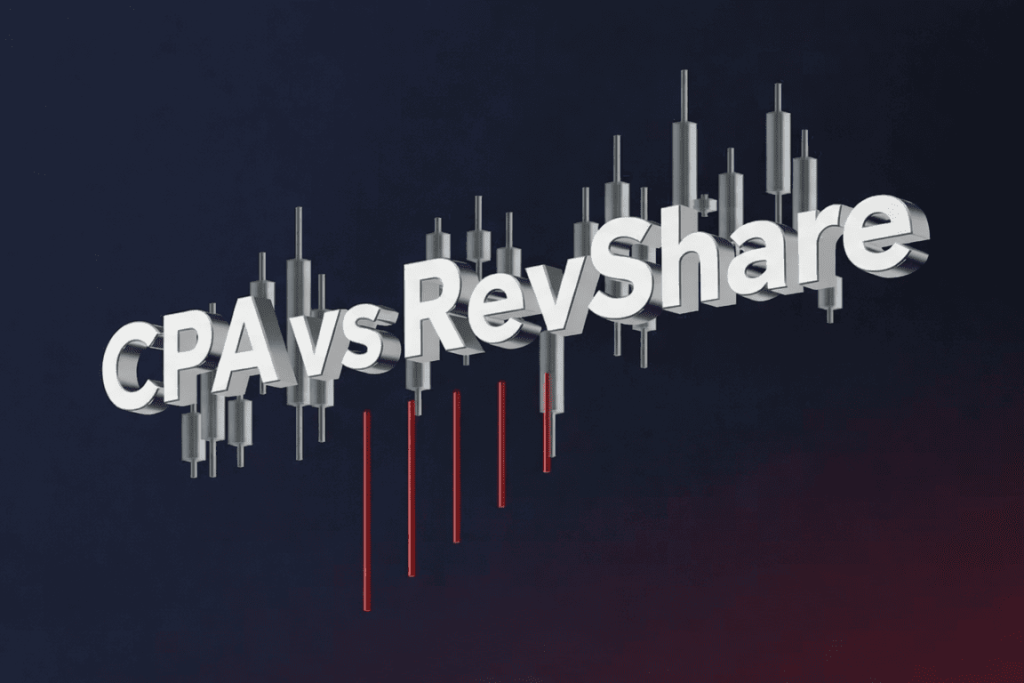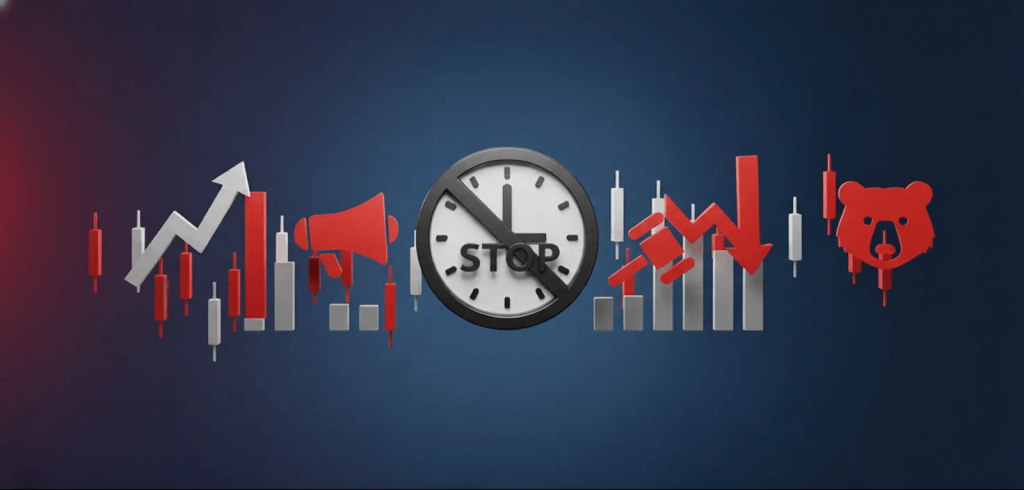
Понимание темных пулов: их функции, критика и примеры
В статье
Скрытые пулы — это частные финансовые площадки или биржи, которые в основном используются институциональными инвесторами для проведения крупных транзакций без немедленного публичного раскрытия информации. Хотя скрытые пулы защищают крупных трейдеров от влияния рынка до заключения сделки, они вызывают опасения относительно прозрачности и справедливости рынка. В этой статье рассматриваются процессы, происходящие в скрытых пулах, обсуждаются недостатки и приводятся примеры, демонстрирующие их функцию и значение на современных финансовых рынках.
Функциональность темных пулов
Институциональные инвесторы, включая паевые инвестиционные фонды, пенсионные фонды и крупные управляющие активами, являются основными бенефициарами скрытых пулов, которые обеспечивают конфиденциальную торговую среду. Они позволяют им проводить значительные транзакции вдали от глаз общественности. В этом разделе мы подробнее рассмотрим особенности работы скрытых пулов и их стратегическое значение в современной торговле.
Оперативная механика
По сути, тёмный пул позволяет исполнять ордера на покупку и продажу без мгновенного раскрытия информации на рынке. Это достигается благодаря механизму, который не отображает цены покупки и продажи до совершения транзакций. В отличие от публичных бирж, где все участники рынка могут наблюдать за каждой транзакцией и изменением цен, тёмные пулы сохраняют завесу тайны вокруг торговой активности.
Ордера, размещаемые в скрытых пулах, обычно сопоставляются внутри системы, то есть торговая система автоматически сопоставляет ордера на покупку и продажу по согласованным ценам, основанным на текущих рыночных условиях, без ручного вмешательства. Хотя эти цены не видны до начала торгов, они, как правило, привязаны к ценам, доступным на публичных биржах, и часто рассчитываются как среднее значение между лучшими доступными ценами спроса и предложения на этих биржах. Такая практика гарантирует, что сделки совершаются по справедливым и конкурентоспособным ценам, не влияя на немедленные колебания цен на рынке в целом.
Стратегические преимущества для институциональных трейдеров
Функциональность тёмных пулов даёт институциональным трейдерам ряд стратегических преимуществ. Прежде всего, обеспечиваемая анонимность помогает предотвратить негативное влияние крупных ордеров на рыночные цены. Например, если институциональному инвестору необходимо продать большое количество акций, это может послужить сигналом для рынка о том, что акции могут быть переоценены или что инвестор ожидает падения их цены, что спровоцирует падение цены, которого продавец надеется избежать. Скрывая ордер до его исполнения, тёмные пулы смягчают такое влияние на рынок, способствуя поддержанию стабильности цен и стоимости актива в течение периода транзакции.
Кроме того, тёмные пулы помогают управлять рыночным риском, связанным с задержкой исполнения крупных сделок. На динамичном рынке цены могут существенно колебаться даже за короткое время, необходимое для исполнения крупного ордера на публичной бирже. Агрегируя и сопоставляя ордера схожего размера в частном порядке, тёмные пулы могут фиксировать цены, защищённые от колебаний публичного рынка в процессе исполнения ордера.
Типы ордеров в даркпулах
Благодаря широкому диапазону типов ордеров, включая рыночные, лимитные и айсберг-ордера, темные пулы предоставляют широкий спектр возможностей торговые стратегии :
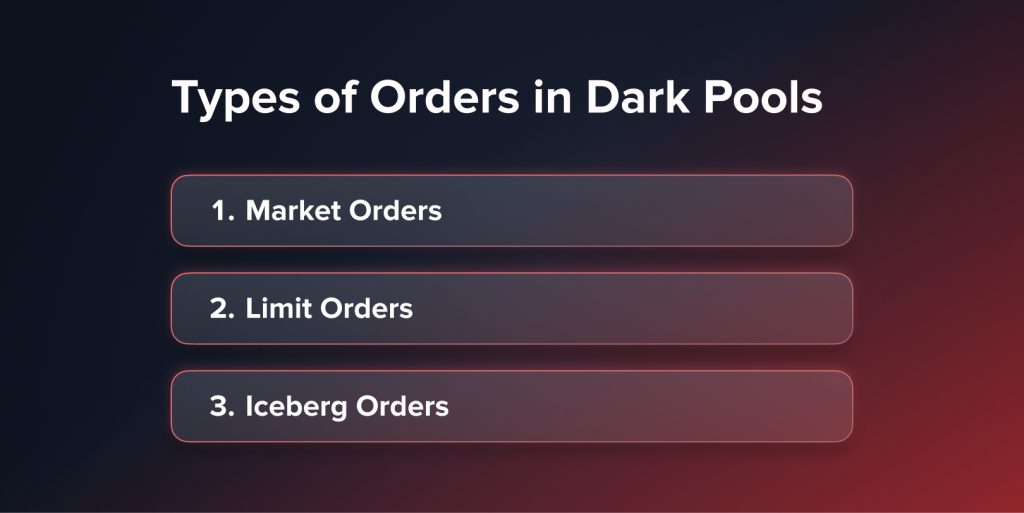
- Рыночные ордера исполняются по наилучшей доступной цене в рамках темного пула без выхода на более широкий рынок.
- Лимитные ордера Указывают максимальную или минимальную цену, по которой трейдер готов купить или продать. Они позволяют контролировать цены исполнения, но не гарантируют его.
- Заказы на айсберг подразумевают отображение только небольшой части крупного ордера, а остальная часть скрыта, чтобы избежать масштабной реакции рынка.
Технологические достижения, влияющие на темные пулы
Технологические усовершенствования способствовали повышению эффективности, безопасности и полезности тёмных пулов. Они развиваются, чтобы соответствовать требованиям современных финансовых рынков, внедряя передовые технологии, такие как блокчейн, искусственный интеллект (ИИ), улучшенное шифрование и бесшовную системную интеграцию.
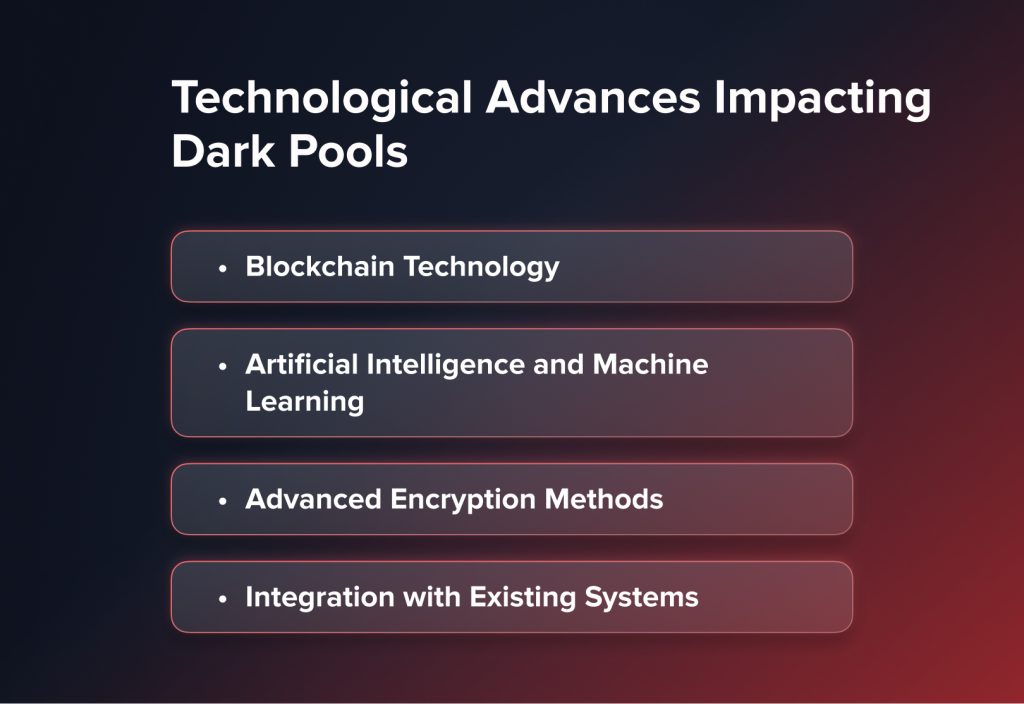
Технология блокчейн
Одним из особенно перспективных применений технологии блокчейн является повышение открытости тёмных пулов с сохранением необходимой анонимности. Блокчейн позволяет безопасно регистрировать сделки, не раскрывая конкретной информации на ранних этапах, благодаря использованию распределённой и неизменяемой системы реестров. Такой подход гарантирует отслеживаемость и аудит всех транзакций, но не нарушает конфиденциальность транзакции до её завершения. Такая прозрачность критически важна не только для соблюдения нормативных требований, но и для поддержания доверия между участниками рынка. Внедрение блокчейна в тёмных пулах может коренным образом изменить способ управления торговыми данными, сделав практически невозможным их скрытое изменение или фальсификацию.
Искусственный интеллект и машинное обучение
Искусственный интеллект и машинное обучение трансформируют управление и исполнение сделок в тёмных пулах, обеспечивая более совершенный анализ данных и процессы принятия решений. Эти технологии способны обрабатывать и анализировать большие наборы данных быстрее традиционных методов, выявляя тенденции и закономерности, которые могут указывать на оптимальные торговые возможности или потенциальные рыночные манипуляции. Системы искусственного интеллекта, например, могут динамически сопоставлять крупные ордера на покупку и продажу с минимальным влиянием на рынок, тем самым повышая эффективность и анонимность крупных транзакций. Более того, мониторинг торговых операций в режиме реального времени, осуществляемый с помощью искусственного интеллекта, помогает выявлять и пресекать хищнические или мошеннические методы торговли, тем самым повышая общую целостность и справедливость торговой среды тёмных пулов.
Расширенные методы шифрования
Надежные меры безопасности крайне важны, учитывая высокие ставки в транзакциях в темных пулах. Передовые технологии шифрования играют ключевую роль в обеспечении безопасного соединения и обмена данными между трейдерами и темными пулами. Использование шифрования защищает все передаваемые данные, включая торговые ордера и имена участников, от несанкционированного доступа. Эта функция безопасности критически важна для защиты конфиденциальной информации и сохранения секретности, которая является залогом привлекательности темных пулов.
You may also like

Интеграция с существующими системами
Технологическая интеграция гарантирует гармоничную работу тёмных пулов с остальной финансовой экосистемой. Передовые интерфейсные технологии и API позволяют тёмным пулам легко интегрироваться с текущими торговыми платформами и публичными биржами. Эта связь критически важна для обеспечения соответствия деятельности тёмных пулов текущим рыночным условиям и нормативным требованиям. Она также помогает поддерживать точность ценообразования, используя данные публичных бирж в режиме реального времени, что позволяет избежать расхождений, которые могут повлиять на стабильность рынка.
Продолжающееся технологическое развитие тёмных пулов устанавливает новые стандарты операционной эффективности, безопасности и соответствия нормативным требованиям. Благодаря использованию блокчейна для повышения прозрачности, использованию искусственного интеллекта для улучшенного сопоставления сделок и выявления мошенничества, обеспечению высочайшего уровня безопасности с помощью передового шифрования и плавной интеграции с существующими финансовыми системами тёмные пулы лучше подготовлены к удовлетворению сложных потребностей современных институциональных инвесторов. Эти технологические усовершенствования расширяют функциональность тёмных пулов и помогают привести их деятельность в соответствие с меняющейся нормативно-правовой базой и этическими стандартами, ожидаемыми участниками рынка.
Критика темных пулов
Несмотря на пользу для некоторых участников рынка, тёмные пулы подвергаются серьёзной критике и пристальному вниманию по ряду причин, особенно в отношении справедливости и прозрачности рынка. В этом расширенном разделе рассматривается глубина этой критики и её последствия для финансовых рынков в целом.
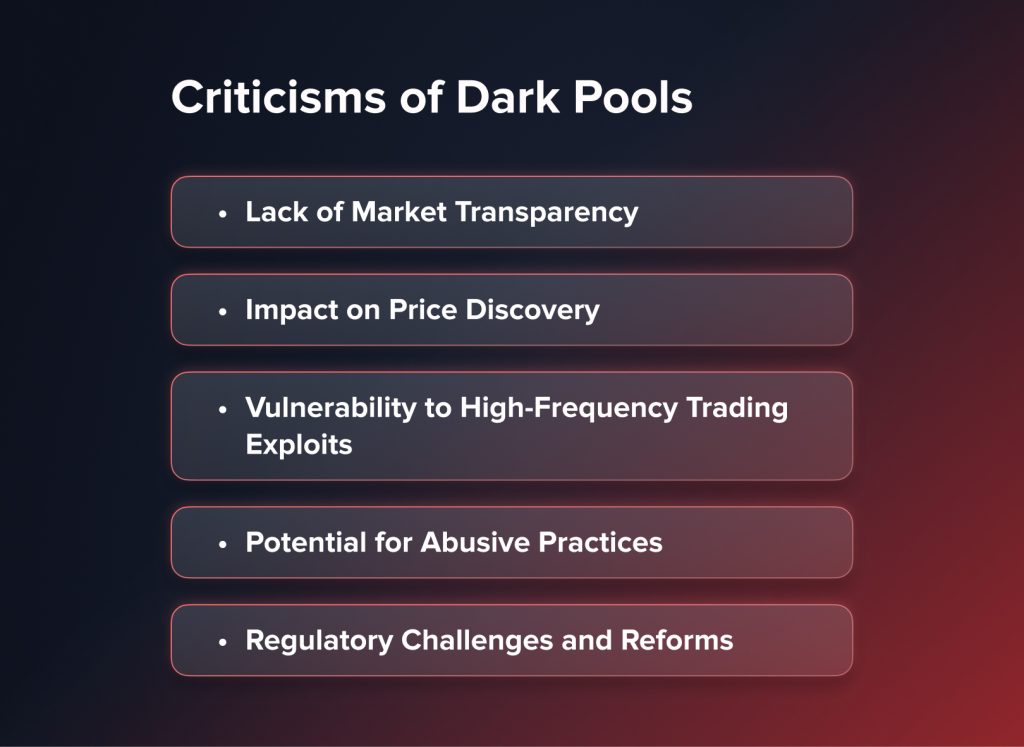
Отсутствие прозрачности рынка
Непрозрачность тёмных пулов — один из их основных недостатков. Скрытые пулы работают, не раскрывая информацию о сделках до завершения сделок, в отличие от публичных бирж, где все детали транзакций видны всем участникам. От значительной части рынка, включая индивидуальных инвесторов, не имеющих доступа к этим секретным торговым платформам, такое отсутствие раскрытия информации может скрывать реальную рыночную активность. Критики утверждают, что это может привести к неравным условиям игры, когда только определённые игроки будут иметь полное представление о рыночной динамике, что может привести к неэффективности рынка и созданию впечатления несправедливости.
Влияние на ценообразование
Скрытые пулы также могут влиять на процесс ценообразования. Транзакции в скрытых пулах не способствуют формированию цен в режиме реального времени, поскольку они скрыты до момента их проведения. Когда большая часть транзакций на рынке совершается вне публичных бирж, это может вызывать проблемы, поскольку может привести к разнице между ценами публичного рынка и реальной рыночной стоимостью. Эта разница может привести к задержке отражения фактической рыночной ситуации относительно публично наблюдаемого ценообразования, что, в свою очередь, повлияет на торговые решения всех участников рынка.
Уязвимость к высокочастотным торговым атакам
Компании, занимающиеся высокочастотной торговлей (HFT), часто используют сложные алгоритмы для анализа рыночных данных и совершают сделки с невероятно высокой скоростью. HFT-стратегии могут использовать непрозрачность тёмных пулов несколькими способами. Например, если HFT-алгоритмы могут предположить вероятность совершения крупной транзакции в тёмном пуле, они могут торговать до этих транзакций на публичных рынках, чтобы извлечь выгоду из ожидаемых ценовых движений. Этот тип деятельности, часто называемый хищнической торговлей, рычаги асимметрия информации, создаваемая темными пулами, может привести к получению значительной прибыли HFT-компаниями за счет других участников рынка.
You may also like
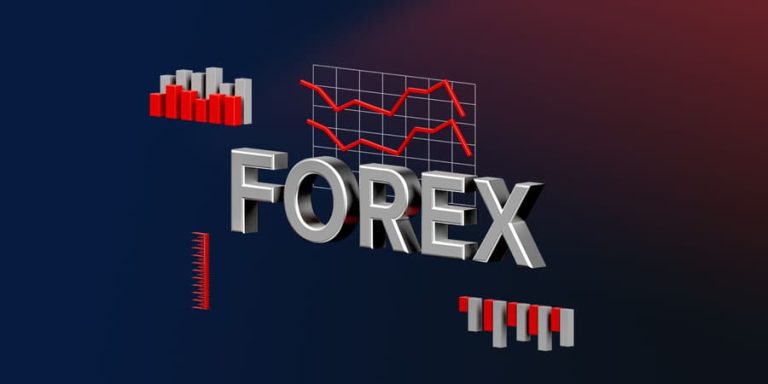
Возможность злоупотреблений
Потенциальные злоупотребления в тёмных пулах вызвали вопросы у Комиссии по ценным бумагам и биржам (SEC) и других регулирующих органов. Фронт-раннинг — один из таких методов, при котором брокер может использовать информацию о предстоящей крупной сделке для совершения сделок до её совершения, получая прибыль от последующих колебаний цен. Хотя это и незаконно, скрытность тёмных пулов позволяет легче скрывать такую деятельность, что создаёт трудности для регулирующих органов.
Проблемы и реформы регулирования
В то время как власти пытаются сократить возможные злоупотребления и повысить прозрачность, условия для деятельности тёмных пулов меняются. Например, Комиссия по ценным бумагам и биржам (SEC) ввела в действие правила, требующие более полного раскрытия информации об операциях тёмных пулов и характере торговли. Несмотря на эти инициативы, сложность по-прежнему заключается в поиске баланса между анонимностью, необходимой крупным институциональным инвесторам, и потребностью рынка в справедливости и открытости.
Примеры темных пулов
Скрытые пулы различаются по структуре собственности и операционной структуре, каждый из которых обслуживает отдельные сегменты финансовых рынков, предлагая различные уровни конфиденциальности и обслуживания. В этом разделе более подробно рассматриваются практические примеры работы скрытых пулов, иллюстрирующие их влияние на динамику рынка и регулирующие органы.
Операционные структуры и примеры
Скрытые пулы, принадлежащие крупным финансовым учреждениям, такие как Goldman Sachs Sigma X и Morgan Stanley MS Pool, облегчают клиентские сделки, используя данные о ценах на рынке в целом. Эти платформы позволяют крупным институциональным инвесторам, таким как паевые инвестиционные фонды (ПИФ), исполнять крупные заказы постепенно, не оказывая существенного влияния на рынок. Например, когда паевому фонду необходимо продать 1,5 миллиона акций конфиденциально, он может сделать это небольшими партиями через скрытый пул, чтобы предотвратить резкое падение цены, которое было бы более вероятным, если бы такая крупная продажа была публично объявлена на традиционных биржах.
Независимые скрытые пулы предлагают схожий функционал, но не привязаны к конкретному брокеру, предоставляя платформу для более широкого круга клиентов, стремящихся к конфиденциальности и меньшему влиянию на рынок. В то же время, скрытые пулы, принадлежащие биржам, например, управляемые Euronext Нью-Йоркской фондовой биржи, сочетают инфраструктуру публичной биржи с преимуществами скрытого пула, предлагая уникальное сочетание прозрачности и конфиденциальности.
Нормативный контроль и правовые проблемы
Прозрачность и справедливость привлекли пристальное внимание законодателей к темным пулам. В 2016 году Barclays и Credit Suisse Были вовлечены в громкое дело, в котором обе компании, предположительно, отдавали предпочтение высокочастотным трейдерам в своих тёмных пулах, тем самым нарушая конфиденциальность и защиту, предоставляемые обычным клиентам. Эти выплаты – 70 миллионов долларов для Barclays и 84,3 миллиона долларов для Credit Suisse – стали одними из крупнейших штрафов за операции в тёмных пулах, что подчёркивает требования регулирующих органов к повышению прозрачности и справедливости на этих торговых платформах.
Другим важным случаем стала компания Investment Technology Group (ITG), которая поселился Комиссия по ценным бумагам и биржам США (SEC) выплатила ей компенсацию в размере 20,3 млн долларов за деятельность, связанную с темным пулом POSIT. В рамках тайной торговой операции, известной как «Проект Омега», было обнаружено, что ITG использовала личные данные своих клиентов для проведения высокочастотных торговых операций, выгодных ITG за счет клиентов. В период с 2010 по 2011 год это нарушение привело к одному из самых крупных штрафов против альтернативной торговой системы на тот момент, что подчеркнуло возможность злоупотреблений в деятельности темного пула и необходимость строгого надзора.
Заключение
Скрытые пулы – сложный аспект современной торговли, требующий взвешивания преимуществ анонимности и меньшего влияния на рынок против рисков, связанных с уменьшением прозрачности. Хотя они позволяют институциональным трейдерам исполнять крупные ордера без быстрого падения цен, они также поднимают серьёзные вопросы о справедливости рынка и возможности злоупотреблений. По мере развития финансовых технологий и усиления контроля со стороны регулирующих органов цели и принципы работы скрытых пулов могут меняться. Понимание принципов работы, преимуществ и опасностей, связанных с скрытыми пулами, критически важно как для участников рынка, так и для наблюдателей при навигации в более широком пространстве финансовых торговых платформ.
Обновлено:
18 декабря 2024 г.


